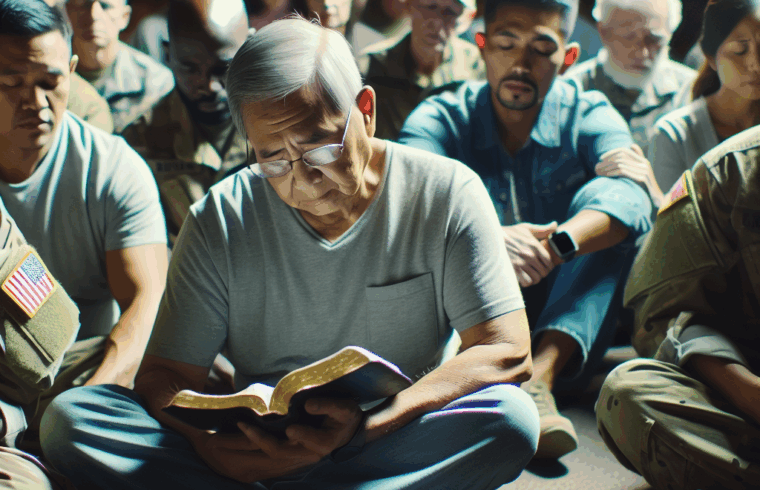==> Thank you for reading this post! Click Here If you are looking for support and Victory over PTSD.
Pain Management Through Faith
Understanding Pain from a Biblical Perspective
As a veteran myself, I know all too well the struggles we face when dealing with pain, both physical and emotional. When we look at the Bible, we find that it doesn’t shy away from discussing suffering. In fact, it provides a profound perspective on pain—one that can help us navigate our battles. Understanding pain as a part of the human experience can open the door to healing.
From my personal experiences, I learned that embracing my pain and seeking God’s guidance can lead to a deeper understanding of my journey. The Bible teaches us that suffering produces perseverance, and through that perseverance, we grow in strength and faith. It’s not easy, but aligning my pain with biblical teachings made a huge difference.
I often turn to verses like 2 Corinthians 12:9, where God tells us that His grace is sufficient for us. This helps me remember that, regardless of the pain, I’m not alone. God’s presence can provide comfort even when the going gets tough.
The Power of Prayer in Healing
Establishing a Prayer Routine
One thing that has been a game-changer for me is making prayer a daily habit. I found that establishing a routine allows me to communicate with God consistently, and that act of reaching out has brought me much comfort. I typically find a quiet spot, take a few deep breaths, and start talking to God like I would to a friend.
It’s amazing how one simple practice can shift your mindset. I ask for strength to endure through pain and wisdom to understand it. I even pray for others who are suffering, which helps shift the focus away from my own pain. The act of prayer can be incredibly healing and reminds me that we’re all in this together.
I also incorporate scripture into my prayers. Using Bible verses allows me to anchor my thoughts and emotions in God’s promises, reinforcing the idea that there is hope and healing on the horizon.
Community Support: Connecting with Others
Finding a Support Group
Connecting with fellow veterans has been invaluable in my journey through pain. Finding a support group, whether in-person or online, creates a space where we can share experiences and find understanding. It feels good to be around people who get what I’m going through.
In these groups, we often discuss our struggles but also celebrate victories, no matter how small. It’s encouraging to hear how others cope and what works for them—it’s like a shared toolbox where we can all gain insights. Personally, hearing stories and overcoming tactics has brought me immense strength.
Plus, it’s comforting just to know that I’m not alone. We’re all in different stages of healing, and being able to lean on one another fosters a sense of belonging, helping me feel more hopeful during tough times.
Self-Care and Rest: Caring for Your Body
Integrating Relaxation Techniques
When we think about managing pain, we can’t overlook the importance of self-care. From my own experience, taking the time to care for my body has been essential. Incorporating relaxation techniques like deep breathing, meditation, and even gentle exercise has helped alleviate some of the physical discomfort associated with pain.
Get Support and Help with Recovery! Visit us for more Information and Support
I’ve found that mindfulness practices, like focusing on the present moment, can ease anxious thoughts that often come with pain. You know, just taking a step back and acknowledging my feelings without judgment allows me to process things in a healthier way.
Sometimes, self-care also means just taking a break to rest. Our bodies need downtime to heal, and it’s okay to prioritize that. Listening to my body and allowing myself to recharge has drastically improved my coping mechanisms.
Trusting in God’s Plan
Letting Go of Control
One of the hardest lessons I’ve faced is learning to let go of control. When pain becomes a part of your daily life, it’s easy to want to grasp every detail tightly—but that only adds stress. Trusting in God’s plan has been a crucial step for me. I’m learning to lean into my faith, which has helped me surrender my worries.
Through prayer and meditation, I’ve discovered that God’s timing isn’t always in sync with my own desires. This becomes easier with practice; I remind myself that I am walking through this journey for a reason, even if it’s unclear at the moment.
Each day offers a new opportunity to trust and have faith. I often reflect on Proverbs 3:5-6, which encourages us to trust in the Lord with all our hearts. This has transformed my perspective, allowing me to find peace despite my circumstances.
FAQs
1. How can faith help veterans dealing with pain?
Faith can provide a framework for understanding pain as a part of life’s journey. It can lead to healing and strength through a deeper relationship with God.
2. What are some effective ways to incorporate prayer into daily life?
Establishing a daily prayer routine, integrating scripture into prayers, and prayer journaling can help nurture that connection with God.
3. Why is community support important for veterans?
Community support fosters a sense of belonging and understanding. Sharing experiences with others in similar situations can provide comfort and encouragement.
4. What role does self-care play in pain management?
Self-care allows your body and mind to heal. Incorporating relaxation techniques and giving yourself permission to rest are key aspects of managing pain.
5. How can one learn to trust in God’s plan during tough times?
Trusting in God’s plan takes practice. Engage in prayer, meditate on scripture, and reflect on past experiences where faith has brought you through difficult times to build trust.













